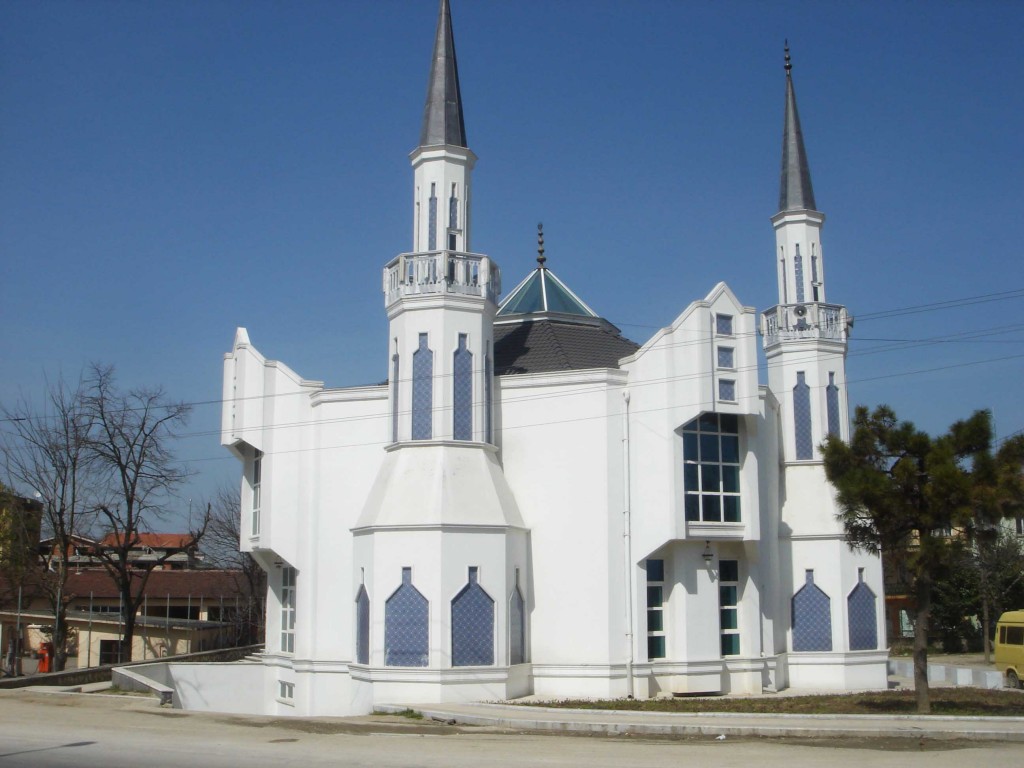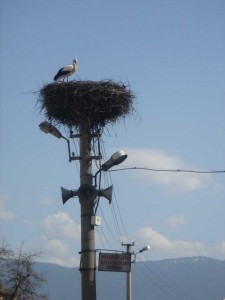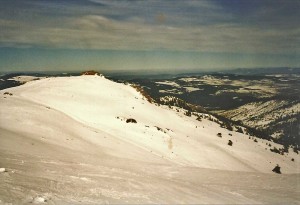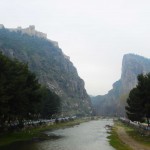
Posted February 5, 2014 Posted by Adam in Uncategorized
This is the camii that was built after the late-1990s earthquake.


Posted February 5, 2014 Posted by Adam in Uncategorized
As usual, I had escaped from Istanbul. My wife would be free to talk to her friends about children and domesticity. I would relive my backpacking youth in places that the Istanbullu do not wish to see.
So I went to Düzce, entirely rebuilt since the disastrous earthquake in the late 1990s. Thence to Bolu, city of storks, mountains and Mudurnu Fried Chicken. On the bus to Ankara, I met Hakan, a jet engine technician for the Turkish Air Force.
“Are you married?” he asked.
“Yes.”
“Where is your wife?”
“In Istanbul.”
“So you are lonely man.”
I never knew how to respond to this. The Turkish word yalnız means both ‘lonely’ and ‘by oneself’. “Mmm,” I said.
“What is your job?”
“I am a teacher.”
“Do you have children?”
“No.”
Hakan’s eyes widened in that way that every Turk with children does when confronted with someone who has yet to taste the joys of parenthood. “I am sorry.”
Hakan, of course, had children. The elder boy, thirteen years old, was taller than his father and headed for basketball stardom. The younger was to be the clever one. Dreams lived out in flesh before a parental audience.
I went to Kastamonu, a lovely city in a steep valley in which people could tell me about their children and commiserate with me on my barren marriage.
On the bus to Sinop, I realised that children travelling long distances in rural areas did not cry or scream or do those objectionable things that I associated with the fundamental problems of childishness. I had a chance to observe why on the 12-hour haul back to Istanbul. The lengthy bus trip from a small, regional centre is something like a mobile village. If someone doesn’t know someone, they know someone in common. Everyone fits into the context, has an identity. Except the foreigner.
I was reading a book. Nobody else was. This wasn’t like the Istanbul to Ankara express where everyone put invisible screens around their cubicles in which they read newspapers, tapped laptops, kept their own world in their headphones. A bus trip from Sinop is a social occasion. An evolutionary explanation for the development of human speech is that it replaces grooming as the activity that maintains social relationships. As human societies grew numbers beyond those who could reasonably be groomed in the course of a day, those who had the capacity to track and cope with the increasing number of social opportunities and threats were more successful in surviving and reproducing. Hence the importance of gossip in maintaining one’s position in society.
The bus to Istanbul was a marvellous opportunity for people to make contact with those members of society whom they saw rarely, or to expand their circle of contacts. The bus was a hive of chatter as people strove to find their neighbours’ context and position in wider society. There were occasional cries of delight as people discovered friends in common or that their children went to the same school.
Children were focal points. In the first part of the journey, parents held their children closely – reassurance for both child and adult in an unfamiliar environment. If the children showed signs of distress, they would be kissed and cuddled and tended until their trust in their parents was again complete.
Once the children were comfortable, they could begin looking around to make sense of this new situation. Now the children could become focal points of social interaction. The child provides a reason for contact to be initiated. One person seeking a reason to speak to another could simply make an admiring comment about a child and a friendship would begin. The children would see that these adults were trustworthy and could go to them when their parents were asleep and no longer providing sufficient attention. The children would move from person to person, confident that their parents were in sight in this mobile, temporary microcosm of the world.
But the foreigner is buried in a book and not giving out the right signals. Occasionally, I would feel my arm or leg being grasped and I would look down to see the inquiring face of a toddler. I would smile at this emissary from society and the child might address a question or a comment to me.
I find it hard to understand children speaking Turkish. The words don’t sound the way I expect so I take time to work out what a Turkish child says. By the time I figure it out, the child has tired of my lack of feedback and moved on to someone more communicative. I doze off.
I wake up with a little girl beside me. She belongs to the family in the seats across the aisle – a man and a woman with a baby and this girl. She must be about three. She is asleep, small enough to sprawl comfortably across the seat.
Her father notices that I have woken up. Do I mind the girl being there, he asks. Of course not, I say. Not as long as she stays silently asleep. The father scoops his daughter onto his lap and sits next to me. His name is Ersen. We are about to have the standard conversation.
“Are you married?” Ersen commences.
I marshal my rusty Turkish to communicate the relevant information. The conversation arrives at the point that always furrows brows. The problem is that my wife is Turkish, we live in London, she is in Istanbul and I am on my own in an inter-city bus coming from the Black Sea coast. This is wrong to Ersen in so many ways that he moves to the universal conversation saver.
“Do you have children?”
“No.”
He looks surprised. Here I am, a married man in his forties but lacking the procreational stamp of masculinity. “How long have you been married?”
“Eight years.”
“Hah.” Ersen looks around. I realise that most of the bus is tuned into this conversation. A middle-aged woman glares at me with the disapproval appropriate for an infidel. “I have been married for five years and look!” He puts on a comic face of long-suffering fatalism and indicates his progeny. His wife laughs.
The bearded man in front leans over the back of his seat to join in. He got onto the bus holding a Kuran but has been too busy showing the games on his phone to the trendy young man next to him to open it. “Did you like Sinop?”
“Yes. It is a wonderful city.” The correct response.
“Have you been anywhere else in Turkey?” This is the steward who hands out the limon kolonya and çay.
It happens that my visit to Sinop completed my twenty-year tour of the 81 provinces of Turkey. I have no idea why I have yielded to this completionist urge but it’s something to say.
“Which was the best city?” Ersen asks. I think about this, not realising that nobody actually wants an answer. “Say ‘Sinop’,” says Ersen.
“No,” says the steward. “It must be Safranbolu.”
“Safranbolu is best for beautiful houses and Sinop is best for beautiful sea.”
There is widespread laughter. I have made the transition to member of the bus community. I slide back into the ritual conversation that works to smooth a 12-hour bus journey into an enjoyable social event. For the next hour, there is a stream of visitors. People share their snacks and I remember my emergency supply of pistachios and bradsticks so I can return the favour.
I doze off after the last relief stop near Bolu. I wake up as we are driving into Izmit, an industrial city whose grimness is relieved by the expanse of the Sea of Marmara. I look down. Birgül, Ersen’s daughter, is in the seat next to me. She looks up at me, assessing my potential for boredom aversion.
“Where are the ships?” she demands.
I look out at the blue stretching to the horizon. An oil tanker flicks into view from behind a dockside building. “There’s one.”
She lifts her head sceptically and peers out. She brightens. “A ship!”
“Another one.” I point.
“More ships.”
Spot-the-ship keeps us going for quite a while. There are shipyards, freighters, ferries and enormous container vessels.
Birgül embarks on a philosophical tack. “Are there fish in there?” She waves at the sea.
“Yes,” I say.
“Have you seen them?”
I think about this. I have eaten fish from the Sea of Marmara. “There are fish shops in Izmit.”
Birgül rejects this circumstantial nonsense. “Can you see fish now?”
I peer at the sea. The nearest part must be two kilometres away. “No,” I concede.
“How do you know there are fish?”
I look away from Birgül’s insistent gaze and catch the eye of her mother. She has clearly been giggling for some time. I aim a brave smile at her and turn back to Birgül. I open my mouth to say something.
“Blue… white… white…” Birgül has moved up onto my lap so she can stare out of the window. She is kneeling on my legs. This hurts. I pick her up and arrange her a little more comfortably. A red car overtakes the bus. “Red!” I realise what she is doing now. “You say the colours,” she says.
I look out at the cars. A black one goes by. “Black.” Four white cars pass all at once. “White, white, white, white.”
Birgül giggles. “They’re all white.” An Audi with a sort of executive, metallic, cloudy bronze paint job comes into view. “What colour is that?”
“I don’t know.” I stare at it. “Yellow,” I come up with.
Birgül bats fondly at me. “No, it’s not. It’s not a taxi.” She leans against me. I look over at her mother. She has gone to sleep. Someone else has her parenting duties for a while. I realise that Birgül is also slumbering peacefully. It’s sort of comforting. The grumpy woman is almost smiling at me. I close my eyes as well.
I wake up with Ersen looming over me. It’s nearly time for them to get off the bus. He wakes Birgül and begins to put her coat on. She shuffles off my lap and gazes around blearily.
“Say goodbye to Adam Abi,” says Ersen. His wife picks up the baby’s carry cot, gives me a smile and heads down the aisle towards the door. Birgül waves sleepily and follows. Ersen holds out his hand. I shake it.
“Ҫok iyi baka olacaksin,” he says.

Next Entries »




